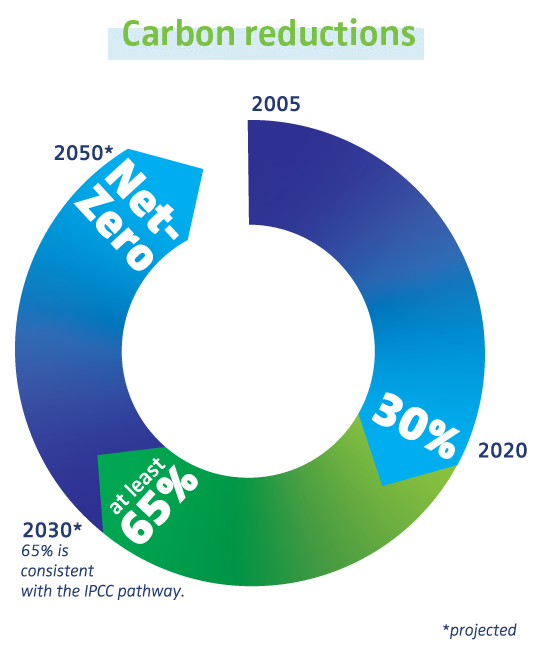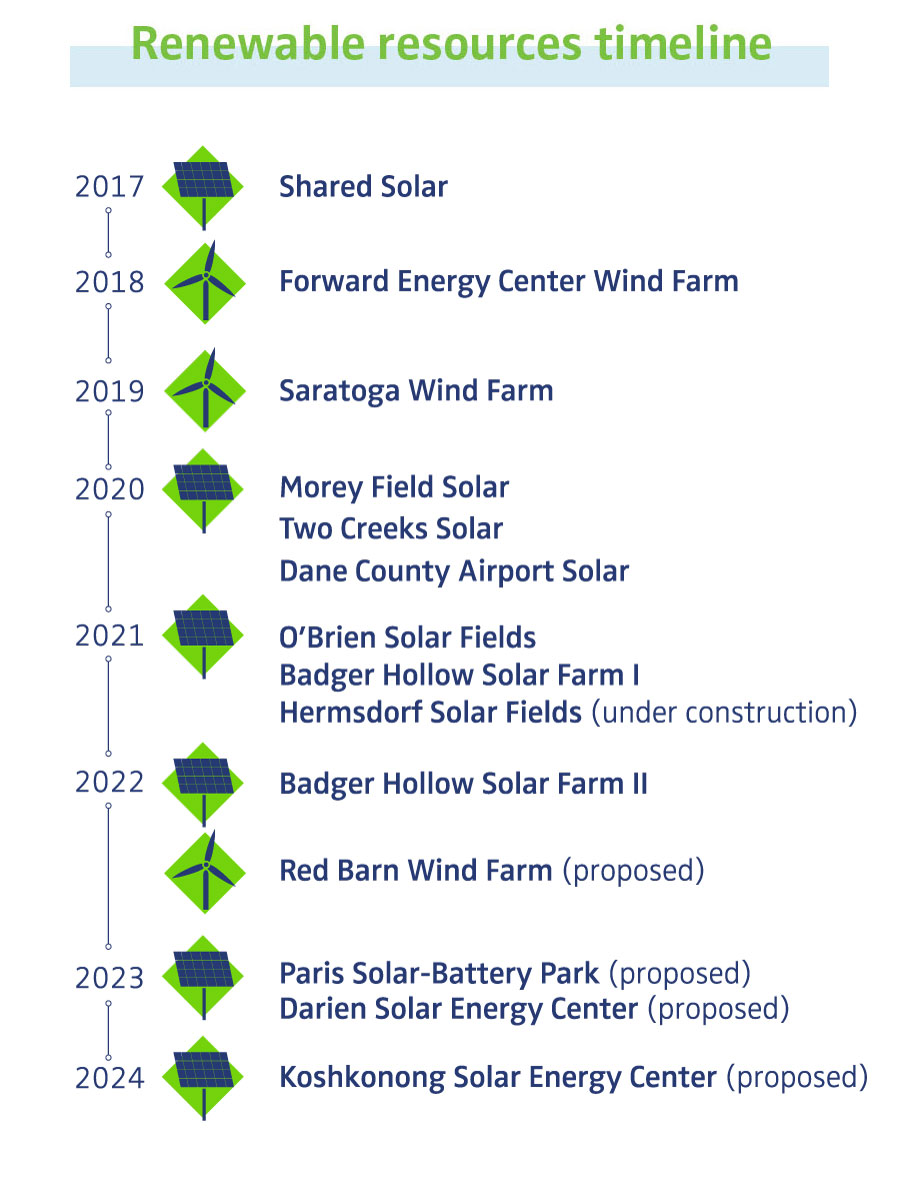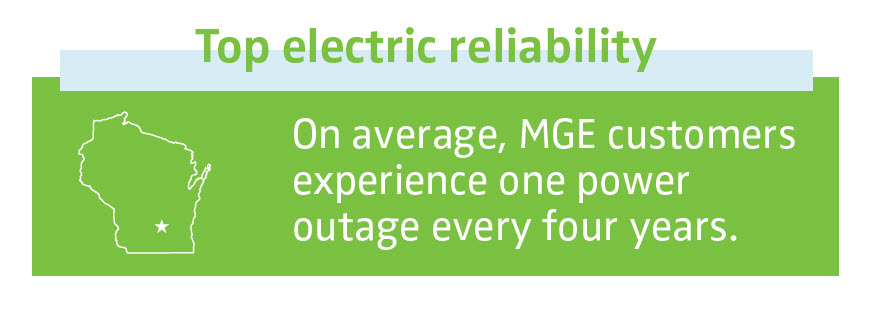Strategy and Sustainability Snapshot
Our goal
Net-zero carbon electricity by 2050
Our strategies to achieve deep decarbonization
- Decarbonize electric generation
- Help our customers use energy efficiently
- Electrify other energy uses, including transportation
Our philosophy
MGE is working to achieve deep decarbonization, consistent with current climate science, as quickly and as cost-effectively as we can. Our carbon reduction goals reflect our vision and signal our direction but do not determine our pace.
Our carbon emissions reductions
In May 2019, MGE announced a goal of net-zero carbon electricity by 2050, which aligns with the Intergovernmental Panel on Climate Change (IPCC) and its assessment of limiting global temperature increases to 1.5 degrees Celsius. Consistent with climate science, we expect to achieve carbon reductions of at least 65% by 2030.

Since 2005, MGE has reduced its carbon emissions 30%. We’ve said since introducing our clean energy and carbon reduction goals—if we can go further faster through partnerships with our customers and the evolution of new technologies, we will.
For emissions reporting, see Reducing emissions and our Edison Electric Institute (EEI) quantitative template at mgeenergy.com/environment.
Our clean energy transition
Since 2015, the company has grown its asset base from $1.7 billion to $2.3 billion, with an estimated $565 million in recent and projected clean energy and battery storage investments through 2024 helping to fuel the company’s ongoing clean energy transition.

Our work with customers
Our Energy 2030 framework for a more sustainable future, introduced in November 2015, guides our work to ensure all customers benefit from our ongoing clean energy transition. MGE is advancing a cleaner energy future cost-effectively while working to maintain our top-ranked electric reliability.
Objectives in our Energy 2030 framework include:
- Transitioning to a more sustainable energy supply
- Giving customers more control around energy
- Reducing costs by managing our collective use of energy
- Building a dynamic, integrated grid to enable new technology
- Ensuring that all customers benefit from changing technology
- Deepening our engagement with the community
Our partnership with the Nelson Institute for Environmental Studies
In 2019, MGE began working with Dr. Tracey Holloway from the University of Wisconsin-Madison's Nelson Institute for Environmental Studies to evaluate the company's goal of net-zero carbon electricity by 2050. Her analysis was done within the context of the October 2018 special report on global warming of 1.5 degrees Celsius by the IPCC. Dr. Holloway used models to analyze MGE’s goal. The models suggested that by 2050, emissions from electricity generation in industrialized countries should be 87% to 99% lower than the 2005 baseline. MGE’s plan for net-zero carbon emissions by 2050 is a 100% reduction from 2005 levels and reflects carbon reductions consistent with limiting global warming to 1.5 degrees Celsius.
We continue to partner with the Nelson Institute to further inform how best to employ our key strategies within our community and with our customers to achieve carbon reductions. The UW-Madison report is available at mge.com/netzeroreport.
Our commitment to reliability
We're investing in long-term sustainability to benefit all stakeholders while maintaining top-ranked energy reliability. Safe, reliable, affordable and sustainable energy powers our communities and critical services, our households and our local economy.
According to an annual industry survey including more than 75 electric utilities nationwide, in 2020, MGE experienced a record-breaking year for electric reliability, recording its best performance ever in the two main industry reliability metrics. MGE saw both the fewest number of outages and the shortest duration of outages per customer in 2020.
System Average Interruption Frequency Index (SAIFI), which measures the frequency of customer outages, was 0.24 in 2020, meaning, on average, MGE customers experience one power outage every four years.

System Average Interruption Duration Index (SAIDI) measures the total time an average customer experiences a non-momentary power interruption in a one-year period. For additional reporting of these metrics, see Safety and Operations section.
Our Board of Directors
Strong oversight by our community-focused Board of Directors, our board’s engagement with management and our participation in third-party benchmarking and evaluation programs help us assess our performance and promote continuous improvement. We take a proactive approach to environmental, social and governance (ESG) matters; corporate responsibility and companywide sustainability; risk assessment and mitigation; and long-term strategy. Board oversight includes assessment of current and/or future environmental regulations. It also includes review of the company’s environmental and sustainability performance and of this report every year. See the Governance and Oversight section of this report for information about our corporate practices.
Our commitment to transparency and disclosure
We have reviewed the recommendations of the Task Force on Climate-related Financial Disclosures (TCFD), performed an analysis of our disclosures relative to the TCFD recommendations and determined that our companywide disclosures are consistent with and responsive to the TCFD guidance and recommendations. We also continually monitor and review the reports of and/or engage with a number of third-party ESG analytics and ratings firms to help inform our reporting to make available and accessible information relevant to our company operations and our industry. We are committed to helping customers, investors and other stakeholders better understand our strategies, risks, challenges and opportunities as we transition to a more sustainable, net-zero carbon future. For more detail on our disclosures and ESG information, visit mgeenergy.com/environment.
To advance further transparency and disclosure in company operations and governance, MGE participates in EEI’s voluntary and industry-specific ESG and sustainability-related reporting. For our EEI reporting templates, visit mgeenergy.com/environment.